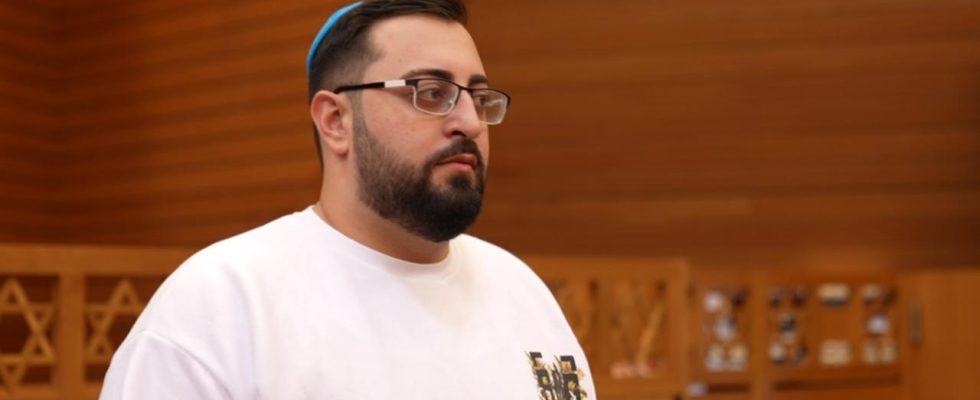Many Jews in Germany have been hiding their identity since October 7th. Students in the Palatinate want to do something about this.
The synagogue in Karlsruhe, a modern building in the shape of a Star of David. It is located just a few steps from the noisy main roads, a place of peace in the countryside. David Rosenberg was born in Baden, and his grandmother and aunt still live in the city today. For him, visiting the synagogue is a look back into his childhood. “I was here often as a small child. So this was the first contact I had with Jewish life, i.e. with festivals like Purim, which I spent here.”
Growing up in a small village in the Palatinate, he realized early on that he was different from most of his fellow human beings. “I still remember in the second grade, the children all came back from their vacation and then reported where they were.” Some classmates were in Greece, others in Turkey or Spain.
“And then I said: I was in Israel. I visited my grandfather there,” says Rosenberg. “And my mother said to me: No, why did you say that now? Now everyone in the village knows that we are Jews! And then I said: Yes, why? And she says: That’s not good if “Everyone knows it.”
“I don’t want those looks”
Living openly his Jewish identity as an adult is not always easy for the student. He took off his kippah when he left the synagogue and put it in his pocket. “Because I can’t stand the looks, I just don’t want to have those looks. If anyone looks at me as if I were something very special. We are a completely normal religious community. And we also want to be treated completely normally.”
Added to this is the fear of attacks, says Rosenberg. “I saw someone in Berlin with a yarmulke and was really impressed by what courage he had. I know friends who have been treated with hostility, who have been beaten. I would like to avoid that.”
Nevertheless, he is committed to making Jewish life in Germany visible and contributing to more normality. Since the beginning of October he has been doing his master’s degree in intercultural education, migration and multilingualism at the Karlsruhe University of Education.
There are Jewish student associations in many cities.
Naturalness Jewish life
He has just founded the “Hinenu Jewish Student Association of Rhineland-Palatinate/Saarland” association. Hinenu means in Hebrew: Here we are! Jewish student associations have long existed in other federal states. He and his colleagues began preparing a year ago, independent of current events.
Young people between the ages of 18 and 35 networked via social media. The young organization has 15 members and potential to grow, hopes Rosenberg. “The association wants to be a contact point. It may also be that the current situation means that many people are even more afraid and then draw less attention to themselves and say: Okay, I actually have a Jewish identity, I want to experience my culture and my religion. “
Unfortunately, there was no such thing when he was young, he says. For Jewish life to be a matter of course, it is also important, especially for students, that society is made aware of Jewish holidays, for example.
Freedom of belief in studies
The freedom of belief and the right to practice religion enshrined in the Basic Law, which is generally uncomplicated for all faith groups in schools, encounters limits during studies because dates are set without taking major religious festivals into account.
“We have a young Jewish student from Mainz who lives an Orthodox life. And if she has to write an exam now, definitely on Yom Kippur or Passover, then she can’t take part. And she can’t retake it either, only in the next semester. There “I have to decide what is more important for me, my religion or my progress at the university. And I think that in 2023 you wouldn’t actually have to make such a choice anymore.”
Self-confident to the public
Rosenberg wants to work for this, but above all for more dialogue – especially in these times. “That half-truths like these, which unfortunately go around all the time on social media, are somehow eliminated.” That’s why he’s now learning Arabic at university. “If I speak the language of others, it can only be an advantage, as we can eradicate prejudices and stereotypes much better.”
It is the right time to go public. “I can’t hide anymore. I think we’ve already hidden ourselves enough in Germany. And we should approach it more confidently than we have so far. And now I’m openly there. I say: I’m Jewish, I live in the Palatinate and that’s a good thing.”

